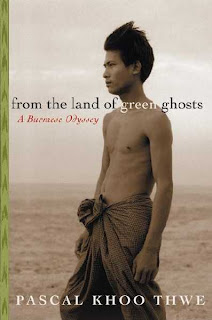What can James Joyce do for you? In the case of Pascal Khoo Thwe, Joyce was responsible for throwing him a lifeline in dire circumstances in the middle of nowhere to a positive future. Yes, Pascal’s love for Joyce as a student cum waiter drew him to John Casey a Cambridge Professor who was touring Mandalay. This chance encounter led him to be rescued by Casey from the jungles along the Thai-Burma border to Cambridge where he became the first Burmese student to complete an honors degree in English Literature!
“From the land of green ghosts” is Pascal’s fabulous memoir that opens a window into one of the most closed countries of today – Burma and offers a perspective from the group that has been at the forefront of fighting for change inside the country – the students.
As a young Padaung growing up in a small town in Shan State, Pascal’s world was his tribe replete with rituals, shamans, soccer games, rice wine. This part of the book helped me understand the multi-cultural nature of Burmese society (the book even had a brief history of Burma which helped set the context). Having tried his hand at entering the seminary Pascal gave it up to go to Mandalay at the age of 17 to study at the prestigious University. Mandalay which was 375 miles away from his home town was an entirely different world and little did he know that this journey would be the foundation for his own awakening.
The transformation from a student to a political activist was catalysed by his falling in love with Moe – a remarkable Burman woman and an underground freedom fighter who was tortured, raped and murdered by the regime. Inspired by Aung San Suu kyi, tribal, religious and cultural differences were set aside when standing united against the Junta. As a reluctant witness to the atrocities perpetrated by the regime, Pascal could no longer take it lying low and his sense of security is shattered even when he returns to his idyllic village.
This sets the stage for the next phase of his life when he becomes a student leader and is forced to take refuge in the jungles along the Thai-Burmese border as a result of the Junta’s crackdown on students. Joining the Karenni guerrillas in these jungles, Pascal has front row seat to the fight against the military in these jungles and witnesses first hand the countless students falling prey to mines, mortars and malaria.
At such a low point in his life, he smuggles out a note to Casey in desperation asking for any help. Casey responds with books, money and a passage to the British embassy in Bangkok and eventually a UK visa and an opportunity to study in Cambridge. Overwhelmed with gratitude to Casey and guilt towards the friends and the cause he was leaving behind, Pascal’s decision to move to Cambridge was one of the most agonizing ones he had to make. A refugee and an outsider in Cambridge, far from the comfort of his tribe and friends, the pressure on Pascal can only be imagined. This memoir is a testimony to his achievements and his contribution to the cause.
On a side note, it was interesting to note the admiration for the British despite the colonial legacy, not just by the author but also from many Burmese tribes. BBC Radio is often their only reliable window to the outside world and life under the British was simply much better for the average Burmese when compared to life under the regime

No comments:
Post a Comment